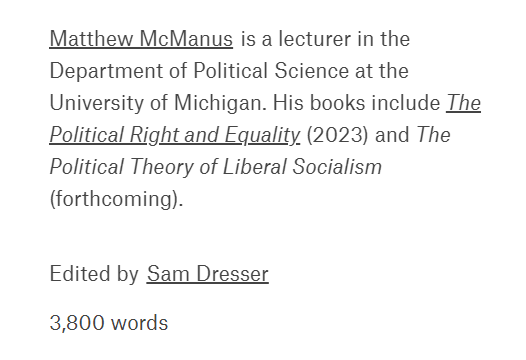As the crisis of democracy deepens, we must return to liberalism's revolutionary and egalitarian roots

https://aeon.co/essays/the-case-for-liberal-socialism-in-the-21st-century

Liberal socialism now

Very few of us expected liberalism to have such a rocky 21st century. At the turn of the 20th, liberal ideology and liberal democratic political institutions seemed more legitimate and secure than ever before. Liberals had defeated their great geopolitical rivals on the fascist Right and the communist Left. How things change. Over the past few decades, discontent and disdain for liberalism have spread across huge swathes of the globe, led by a resurgent Right-wing populism that denounced its materialism, universalism and libertine decadence. Wannabe strongmen like Victor Orban declared they were constructing new kinds of ‘illiberal democracy’ – a half truth, since the regimes would be illiberal, but not particularly democratic. Books flooded the market with alarmist or triumphalist titles such as Why Liberalism Failed (2018) or A World After Liberalism (2021), all of which diagnosed its failures with relish or fear. Theories about what had gone wrong multiplied. Liberalism was too atomistic, too alienating, too antidemocratic, too democratic for its own good, too beholden to the ignorant masses, too elitist, even too boring and politically correct for its own good.
What was often lost in the discourse around liberalism in the 21st century was whether it could simultaneously be worth saving while also having deserved the ignominy into which it was falling. From the 1970s onwards, many liberal politicians and theorists had backed away from the more progressive and transformative propensities of the tradition. The era of big liberal dreams about establishing a ‘great’ or ‘just’ society was over. Internalising a host of conservative arguments, liberals like Isaiah Berlin or Friedrich Hayek argued that big dreams were dangerous and contrary to liberalism, its revolutionary past aside. The best one could hope for was a competitive and highly inequitable neoliberal society defined by ordered liberty and at most a minimal welfare state. That such a consciously deflated vision became associated with technocratic aloofness, a lack of principled conviction and a wariness of democratic accountability came as a surprise only to neoliberals c2016. More thoughtful commentators followed Samuel Moyn’s claim in Liberalism Against Itself (2023) that if liberals couldn’t rediscover how to not just fearmonger, but inspire, they were unlikely to see their doctrine survive much longer and, ‘anyway, survival is not good enough.’

Adam Smith, artist unknown, painted posthumously c1795. Courtesy the National Gallery of Scotland
Moyn is right that, if liberals trade off presenting an inspiring vision of the future for mere survival, they are unlikely to get either. The existential woes of 21st-century liberalism require we do more than return to the forms of neoliberal governance that generated discontent in the first place. It requires retrieving the revolutionary emancipatory and egalitarian ethos that defined liberalism at its revolutionary best to offer a new deal to citizens of liberal states. The strand of liberal political theory that offers the richest guidance on what form this new deal should take is liberal socialism. The idea of ‘liberal socialism’ might appear odd and even oxymoronic. This is especially true for those on the Right and the Left who regard liberalism as the philosophy of market capitalism. Of course, there are many classical and neoliberal thinkers for whom that is true. From John Locke’s emphatic defence of life, liberty and property to Hayek’s declaration that state planning in the economy was the road to serfdom, liberal defences of the ethics of capitalism are easy to find. The economist Ludwig von Mises no doubt spoke for many (including plenty on the Left) when, in his polemical tract Liberalism (1927), he proudly declared that:

But this would be to ignore the reality that many great liberal thinkers have historically been wary (to downright critical) of capitalism. This goes far back. Adam Smith may have been an enthusiast for free trade and market liberties, but in The Theory of Moral Sentiments (1759) he also decried how:

snip
Voltaire2
(13,039 posts)It is a mistake to view fascism as the antithesis of liberalism. Consider, for example, the lived experience of african americans within the liberal democratic republic of the united states. When have they not experienced a fascist regime?
The Magistrate
(95,247 posts)Read with attention, he is certainly far more to our side than the other.
Beastly Boy
(9,354 posts)Smith is pro free markets, not pro-capitalism. He actually warned about the collusion of unregulated big capital with corrupted big government.
As Smith foresaw, big capital is actually anti-free market, the reality we are living in today. Marx, an admirer of Smith, merely picked up on this foresight and expanded it in a direction which, ironically, Smith also criticized and warned us about.
Capitalism isn't pro-free market. Socialism isn't pro-free market. Liberalism is. These are distinctions that are lost on so many of us.
Which reminds me: I also wonder why the distinction between socialism (or any ideology to the left of it) and liberalism is getting lost in translation too.